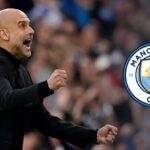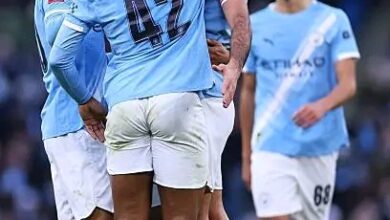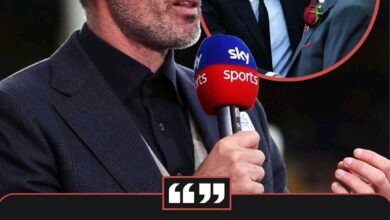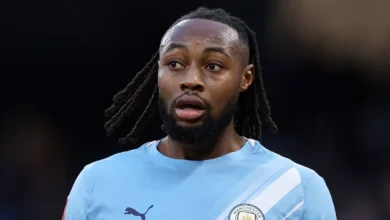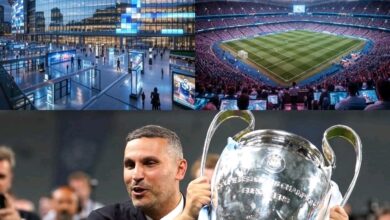Real Madrid sets sights on Rodri as top midfield target after Champions League elimination.
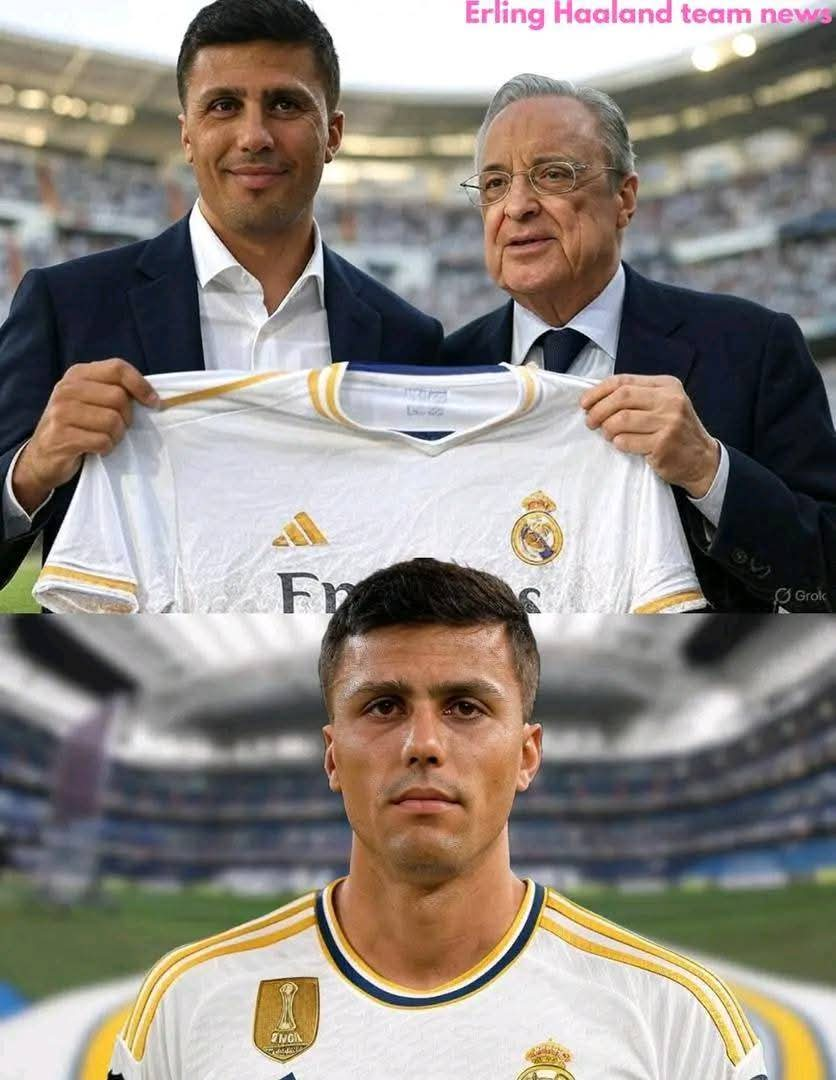
Following their unexpected Champions League elimination, Real Madrid finds itself at a crucial juncture in their squad planning for the upcoming 2025/26 season. The Spanish giants, known for their ability to bounce back from setbacks with strategic acquisitions, have reportedly identified Manchester City’s Rodri as their primary midfield target. This potential transfer represents more than just a player acquisition—it symbolizes Real Madrid’s commitment to maintaining their competitive edge while addressing fundamental gaps in their squad composition.
The pursuit of Rodri comes at a time when Los Blancos are experiencing significant transitions in their midfield department. With veteran midfielder Toni Kroos approaching the twilight of his illustrious career and expected to depart the Santiago Bernabéu, Real Madrid faces the daunting task of replacing one of the most influential playmakers in modern football. The German international’s potential exit leaves a void that requires careful consideration and strategic planning to fill adequately
Real Madrid’s interest in Rodri is intrinsically linked to their improved financial understanding following the conclusion of their European campaign. According to reports from Cadena SER, the premature end to their Champions League journey has provided the club with greater clarity regarding their financial position for the upcoming transfer window. This clarity encompasses various revenue streams, including domestic competitions, commercial partnerships, and crucially, the obligations related to player performance bonuses.
The financial implications of their Champions League exit, while disappointing from a sporting perspective, have created an unexpected silver lining in terms of budget allocation. The money previously earmarked for potential deep European run bonuses can now be redirected toward strengthening the squad for future campaigns. This reallocation of funds represents a pragmatic approach to squad building that has become increasingly important in the post-pandemic football economy.
Furthermore, Real Madrid anticipates additional financial support from their participation in the upcoming FIFA Club World Cup. This relatively new competition promises substantial financial rewards for participating clubs, particularly those of Real Madrid’s caliber and global appeal. The additional revenue stream from this tournament could prove pivotal in facilitating high-profile transfers, including the potential acquisition of Rodri.
At 28 years old, Rodrigo Hernández Cascante, commonly known as Rodri, represents the ideal candidate to spearhead Real Madrid’s midfield transformation. The Spanish international has established himself as one of the premier defensive midfielders in world football, combining exceptional technical ability with tactical intelligence and leadership qualities that align perfectly with Real Madrid’s playing philosophy.
Rodri’s recent recognition as a Ballon d’Or contender underscores his elite status within the global football hierarchy. This recognition is particularly significant as it highlights his ability to influence games at the highest level while maintaining consistency across multiple competitions and seasons. For Real Madrid, acquiring a player of such caliber would represent a statement of intent and a commitment to maintaining their position among Europe’s elite clubs.
The Spanish midfielder’s playing style offers several attributes that would seamlessly integrate into Real Madrid’s tactical framework. His ability to dictate tempo from deep positions mirrors the role traditionally occupied by Kroos, while his defensive capabilities provide additional security that could enhance the team’s overall balance. Rodri’s experience in high-pressure situations, including Champions League finals and international tournaments, makes him an ideal candidate for a club with Real Madrid’s expectations and ambitions.
Despite Real Madrid’s strong interest, acquiring Rodri presents significant challenges that extend beyond financial considerations. The midfielder remains a cornerstone of Manchester City’s success under Pep Guardiola, serving as the fulcrum around which their possession-based system operates. His importance to City cannot be overstated, as evidenced by their struggles in matches where he has been absent due to injury or suspension.
Rodri’s contract situation adds another layer of complexity to any potential transfer. With his current deal extending until 2027, Manchester City holds a strong negotiating position and would likely demand a premium fee for one of their most valuable assets. The English champions have consistently demonstrated their reluctance to sell key players, particularly to direct European rivals, making any negotiation a delicate and potentially protracted process.
However, Real Madrid’s optimism regarding a potential deal may stem from several factors beyond mere financial capability. The club’s historical appeal and prestige continue to hold significant sway with top players, often serving as decisive factors in transfer negotiations. Additionally, the opportunity to return to Spain and represent one of the world’s most prestigious clubs could prove attractive to Rodri, particularly given his deep connections to Spanish football culture.
An intriguing aspect of Real Madrid’s pursuit involves the potential influence of Dani Carvajal, Rodri’s national team colleague and friend. Personal relationships have increasingly become important factors in modern transfer negotiations, with players often seeking advice and reassurance from trusted colleagues before making career-defining decisions.
Carvajal’s presence at Real Madrid could serve as a valuable asset in convincing Rodri to consider the move. The right-back’s firsthand experience of life at the Santiago Bernabéu, combined with his understanding of the club’s culture and expectations, could provide crucial insights that influence Rodri’s decision-making process. This personal connection represents a unique advantage that Real Madrid can leverage in their pursuit of the midfielder.
The Spanish national team environment has traditionally served as a breeding ground for club transfers, with players forming bonds that extend beyond international duty. Carvajal’s potential role as an unofficial ambassador for Real Madrid could prove instrumental in bridging any initial reluctance Rodri may have about leaving Manchester City’s comfortable environment
One significant concern that could impact Real Madrid’s pursuit of Rodri relates to his recent serious knee injury. The midfielder suffered a significant setback that required extensive rehabilitation and raised questions about his long-term fitness and performance levels. For a club investing potentially massive resources in a player, such medical concerns cannot be overlooked or underestimated.
Real Madrid’s medical team would undoubtedly conduct comprehensive evaluations to assess Rodri’s recovery progress and future injury risk. The club’s history with injury-prone signings has taught them the importance of thorough medical due diligence before completing high-profile transfers. The balance between securing a world-class talent and managing potential long-term risks represents a crucial consideration in their decision-making process.
The timing of any potential transfer could be influenced by Rodri’s recovery timeline and his return to peak physical condition. Real Madrid may prefer to monitor his rehabilitation progress closely before committing to a deal, ensuring that any investment aligns with their expectations for immediate impact and long-term contribution.
While Rodri remains Real Madrid’s preferred target, the club’s strategic planning includes evaluation of alternative options, notably Real Sociedad’s Martin Zubimendi. The 25-year-old Spanish midfielder has emerged as one of La Liga’s most promising talents, offering a younger profile with significant potential for development.
However, internal doubts within Real Madrid regarding Zubimendi’s suitability suggest that he may not possess all the attributes deemed necessary for their midfield requirements. These concerns could relate to various factors, including his experience at the highest level, his ability to handle pressure, or his tactical fit within their preferred system.
The situation becomes more complex with reports of Arsenal’s advanced negotiations with Zubimendi. The Premier League club’s apparent progress in securing his services could force Real Madrid to accelerate their pursuit of Rodri or identify additional alternatives. This competitive dynamic illustrates the interconnected nature of the modern transfer market, where decisions regarding one target can significantly impact strategies for others.
perspective, Rodri’s integration into Real Madrid’s system would require careful consideration of the team’s overall balance and playing style. The midfielder’s strengths in ball retention, defensive positioning, and progressive passing align well with the possession-based approach favored by modern Real Madrid teams.
His ability to operate as a single pivot or as part of a double pivot system provides tactical flexibility that could prove valuable across different competitions and against varying opposition styles. This versatility would allow Real Madrid’s coaching staff to adapt their approach based on specific match requirements while maintaining consistency in their core playing principles.
The potential partnership between Rodri and existing midfield talents like Jude Bellingham, Eduardo Camavinga, and Aurélien Tchouaméni presents exciting possibilities for tactical evolution. Each player brings unique attributes that, when combined effectively, could create a midfield unit capable of dominating possession while providing defensive stability and creative spark.
The financial aspects of pursuing Rodri extend beyond the initial transfer fee to encompass wages, agent fees, and long-term contract considerations. Manchester City’s strong financial position means they can afford to demand premium compensation for one of their key assets, potentially setting a new benchmark for defensive midfielder transfers.
Real Madrid’s approach to this potential deal reflects broader trends in modern football economics, where clubs must balance immediate investment with long-term financial sustainability. The Spanish giants have demonstrated their ability to complete marquee signings while maintaining fiscal responsibility, a skill that will be crucial in any Rodri negotiation.
The impact of Financial Fair Play regulations and UEFA’s evolving compliance framework adds additional complexity to transfer planning. Real Madrid must ensure that any significant investment aligns with regulatory requirements while supporting their competitive objectives across multiple competitions.
Rodri’s potential arrival would represent part of a broader squad evolution at Real Madrid, reflecting the natural transition from one generation of players to the next. The club’s recent transfer activity has focused on securing young, talented players while gradually phasing out aging stars, creating a blend of experience and potential.
This strategic approach ensures continuity while preparing for future challenges and opportunities. Rodri’s profile fits perfectly within this framework, offering immediate impact while providing leadership and experience for younger players to learn from and develop alongside.
The midfielder’s potential arrival could also influence other transfer decisions and squad planning considerations. His presence might affect the development opportunities available to academy graduates or impact the club’s approach to other midfield positions.
Rodri’s potential move to Real Madrid would have significant implications for Spanish football and the national team setup. His return to La Liga would strengthen the domestic league’s profile while potentially enhancing his integration with Spanish national team colleagues who play for Real Madrid.
The concentration of Spanish talent at Real Madrid has historically benefited both club and country, creating familiarity and understanding that translates into improved performance at the international level. Rodri’s addition to this group could enhance Spain’s prospects in upcoming tournaments while providing Real Madrid with players who understand each other’s games intimately.
Real Madrid’s pursuit of Rodri represents more than a simple player acquisition—it embodies their commitment to maintaining elite status while adapting to evolving football dynamics. The potential transfer encompasses financial, tactical, medical, and strategic considerations that reflect the complexity of modern football operations.
The success or failure of this pursuit will likely influence Real Madrid’s approach to future transfer windows and their ability to compete at the highest level. For Rodri, the decision represents a career-defining moment that could shape his legacy and determine his role in Spanish football history.
As negotiations potentially unfold, the football world will watch closely to see whether Real Madrid can successfully navigate the challenges involved in securing one of world football’s premier defensive midfielders. The outcome will undoubtedly have lasting implications for all parties involved and could set precedents for future high-profile transfers.
The story of Real Madrid’s interest in Rodri continues to evolve, reflecting the dynamic nature of modern football and the constant pursuit of excellence that defines the sport’s elite level. Whether this pursuit culminates in a successful transfer remains to be seen, but the implications and considerations involved illustrate the sophisticated planning and strategic thinking required to succeed in contemporary football.




